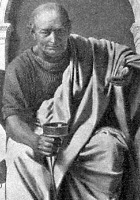Bkiii:Vi Moral Decadence Poem by Horace
Bkiii:Vi Moral Decadence
Romans, though you’re guiltless, you’ll still expiate
your fathers’ sins, till you’ve restored the temples,
and the tumbling shrines of all the gods,
and their images, soiled with black smoke.
You rule because you are lower than the gods
you worship: all things begin with them: credit
them with the outcome. Neglected gods
have made many woes for sad Italy.
Already Parthians, and Monaeses
and Pacorus, have crushed our inauspicious
assaults, and laugh now to have added
our spoils to their meagre treasures.
Dacians and Ethiopians almost toppled
the City, mired in civil war, the last feared
for their fleet of ships, and the others
who are best known for their flying arrows.
Our age, fertile in its wickedness, has first
defiled the marriage bed, our offspring, and homes:
disaster’s stream has flowed from this source
through the people and the fatherland.
The young girl early takes delight in learning
Greek dances, in being dressed with all the arts,
and soon meditates sinful affairs,
with every fibre of her new being:
later at her husband’s dinners she searches
for younger lovers, doesn’t mind to whom she
grants all her swift illicit pleasures
when the lights are far removed, but she rises,
openly, when ordered to do so, and not
without her husband’s knowledge, whether it’s for
some peddler, or Spanish ship’s captain,
an extravagant buyer of her shame.
The young men who stained the Punic Sea with blood
they were not born of such parentage, those who
struck at Pyrrhus, and struck at great
Antiochus, and fearful Hannibal:
they were a virile crowd of rustic soldiers,
taught to turn the furrow with a Sabine hoe,
to bring in the firewood they had cut
at the instruction of their strict mothers.
when the sun had lengthened the mountain shadows,
and lifted the yokes from the weary bullocks,
bringing a welcome time of rest,
with the departure of his chariot.
What do the harmful days not render less?
Worse than our grandparents’ generation, our
parents’ then produced us, even worse,
and soon to bear still more sinful children.
This poem has not been translated into any other language yet.
I would like to translate this poem